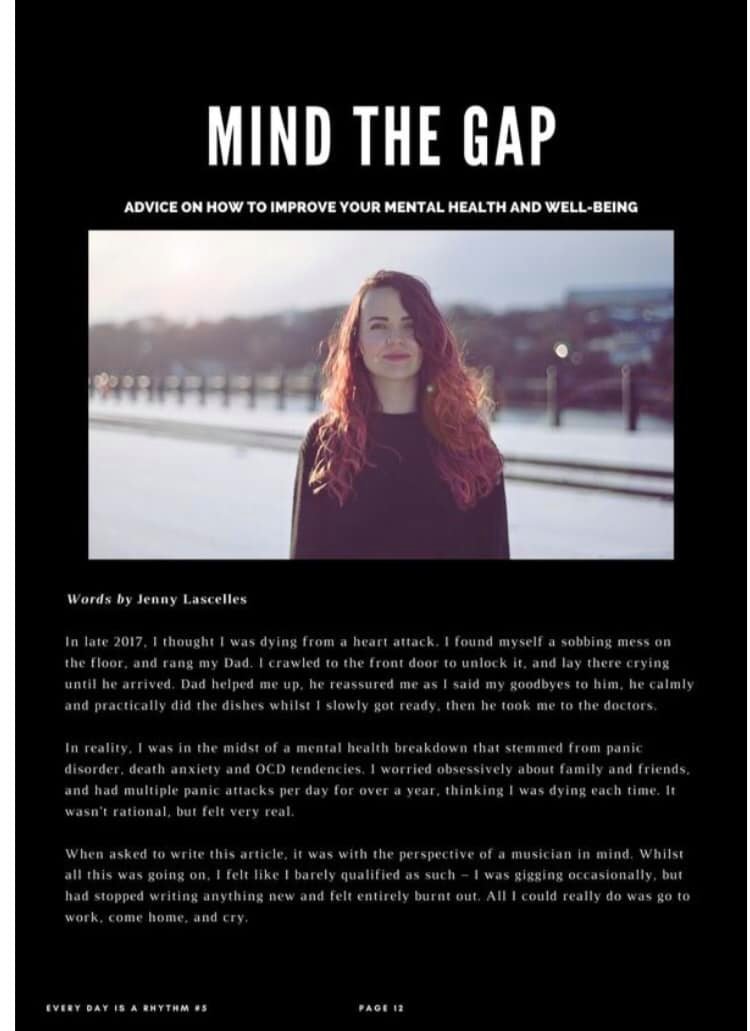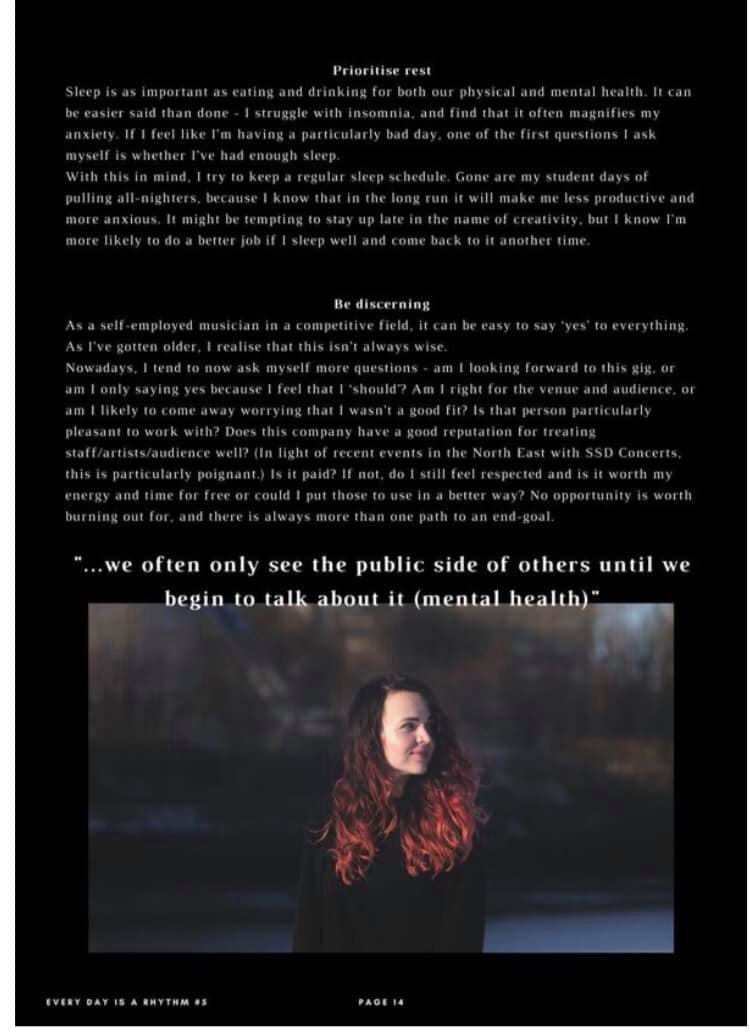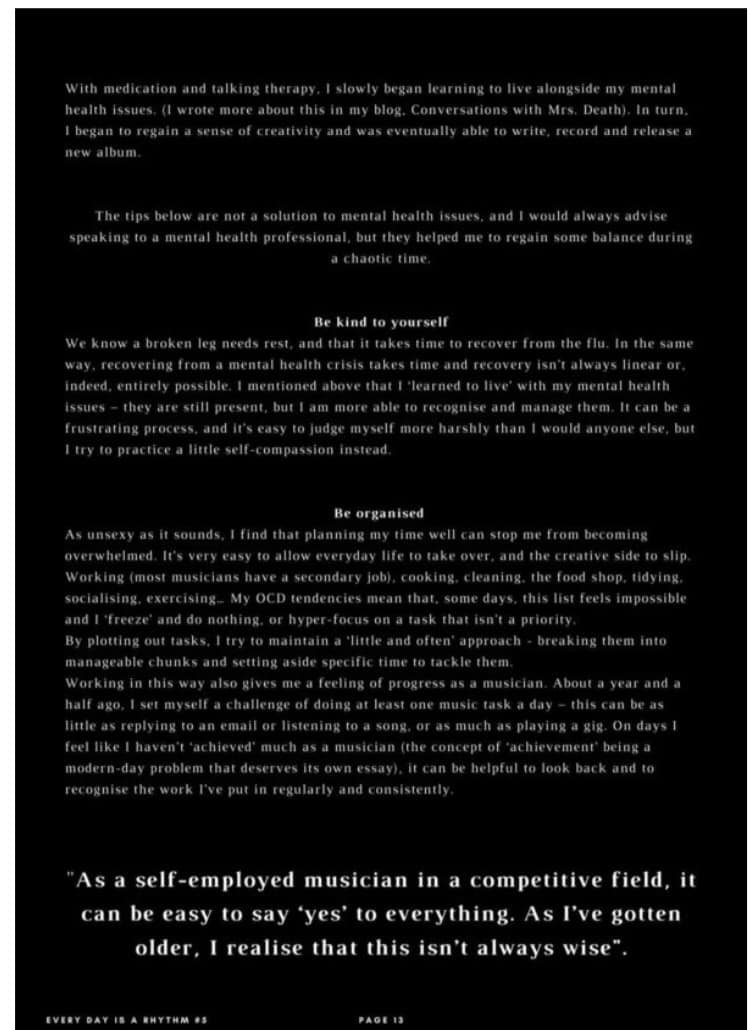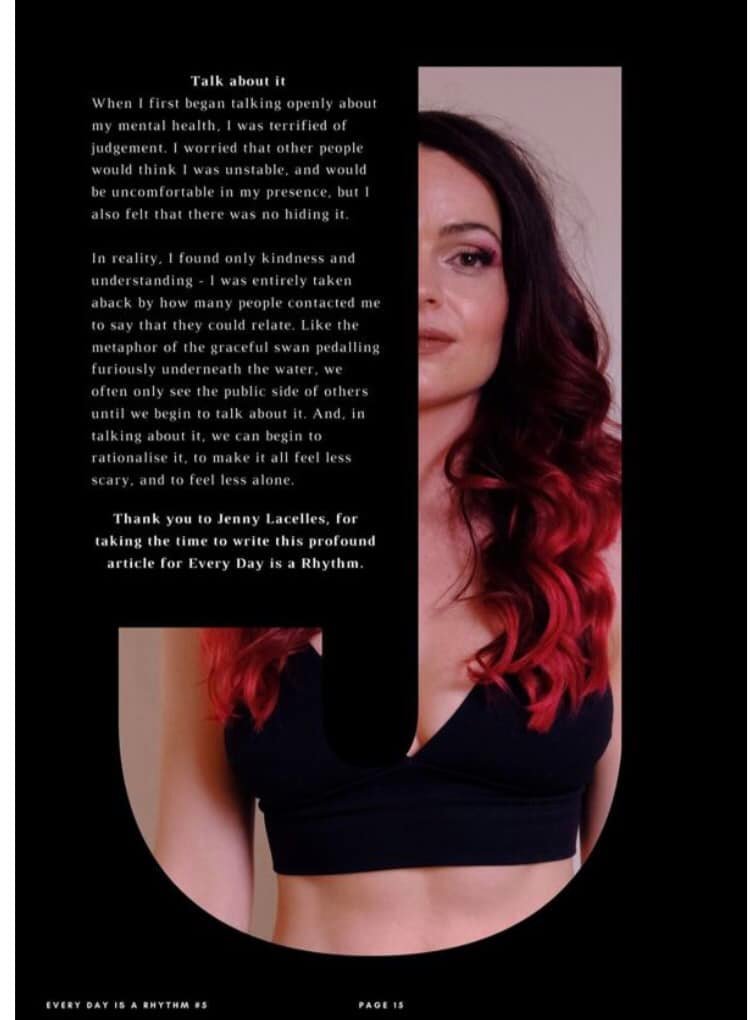Mind the Gap- Feature Article
I lately had the privilege of being asked to write a Mind the Gap article for Every Day is a Rhythm magazine, in which I discuss my own battles with mental health, including a breakdown I had a few years ago, and some tips that I found helped me make it out the other side.
It’s a real privilege to be featured alongside other North East creatives, and a great project to be part of, that campaigns for better mental health and wellbeing, and helps to break down stigmas.
The full text of my article is below, and you can read the full Every Day is a Rhythm issue 5 here - I highly recommend it:
Mind the Gap
In late 2017, I thought I was dying from a heart attack. I found myself a sobbing mess on the floor, and rang my Dad. I crawled to the front door to unlock it, and lay there crying until he arrived. Dad helped me up, he reassured me as I said my goodbyes to him, he calmly and practically did the dishes whilst I slowly got ready, then he took me to the doctors.
In reality, I was in the midst of a mental health breakdown that stemmed from panic disorder, death anxiety and OCD tendencies. I worried obsessively about family and friends, and had multiple panic attacks per day for over a year, thinking I was dying each time. It wasn’t rational, but felt very real.
When asked to write this article, it was with the perspective of a musician in mind. Whilst all this was going on, I felt like I barely qualified as such – I was gigging occasionally, but had stopped writing anything new and felt entirely burnt out. All I could really do was go to work, come home, and cry.
With medication and talking therapy, I slowly began learning to live alongside my mental health issues. (I wrote more about this in my blog, Conversations with Mrs. Death). In turn, I began to regain a sense of creativity and was eventually able to write, record and release a new album.
The tips below are not a solution to mental health issues, and I would always advise speaking to a mental health professional, but they helped me to regain some balance during a chaotic time.
Be kind to yourself.
We know a broken leg needs rest, and that it takes time to recover from the flu. In the same way, recovering from a mental health crisis takes time and recovery isn’t always linear or, indeed, entirely possible. I mentioned above that I ‘learned to live’ with my mental health issues – they are still present, but I am more able to recognise and manage them. It can be a frustrating process, and it’s easy to judge myself more harshly than I would anyone else, but I try to practice a little self-compassion instead.
Be organised.
As unsexy as it sounds, I find that planning my time well can stop me from becoming overwhelmed. It’s very easy to allow everyday life to take over, and the creative side to slip. Working (most musicians have a secondary job), cooking, cleaning, the food shop, tidying, socialising, exercising… My OCD tendencies mean that, some days, this list feels impossible and I ‘freeze’ and do nothing, or hyper-focus on a task that isn’t a priority.
By plotting out tasks, I try to maintain a ‘little and often’ approach - breaking them into manageable chunks and setting aside specific time to tackle them.
Working in this way also gives me a feeling of progress as a musician. About a year and a half ago, I set myself a challenge of doing at least one music task a day – this can be as little as replying to an email or listening to a song, or as much as playing a gig. On days I feel like I haven’t ‘achieved’ much as a musician (the concept of ‘achievement’ being a modern-day problem that deserves its own essay), it can be helpful to look back and to recognise the work I’ve put in regularly and consistently.
Prioritise rest.
Sleep is as important as eating and drinking for both our physical and mental health. It can be easier said than done - I struggle with insomnia, and find that it often magnifies my anxiety. If I feel like I’m having a particularly bad day, one of the first questions I ask myself is whether I’ve had enough sleep.
With this in mind, I try to keep a regular sleep schedule. Gone are my student days of pulling all-nighters, because I know that in the long run it will make me less productive and more anxious. It might be tempting to stay up late in the name of creativity, but I know I’m more likely to do a better job if I sleep well and come back to it another time.
Be discerning.
As a self-employed musician in a competitive field, it can be easy to say ‘yes’ to everything. As I’ve gotten older, I realise that this isn’t always wise.
Nowadays, I tend to now ask myself more questions - am I looking forward to this gig, or am I only saying yes because I feel that I ‘should’? Am I right for the venue and audience, or am I likely to come away worrying that I wasn’t a good fit? Is that person particularly pleasant to work with? Does this company have a good reputation for treating staff/artists/audience well? (In light of recent events in the North East with SSD Concerts, this is particularly poignant.) Is it paid? If not, do I still feel respected and is it worth my energy and time for free or could I put those to use in a better way? No opportunity is worth burning out for, and there is always more than one path to an end-goal.
Talk about it.
When I first began talking openly about my mental health, I was terrified of judgement. I worried that other people would think I was unstable, and would be uncomfortable in my presence, but I also felt that there was no hiding it.
In reality, I found only kindness and understanding - I was entirely taken aback by how many people contacted me to say that they could relate. Like the metaphor of the graceful swan pedalling furiously underneath the water, we often only see the public side of others until we begin to talk about it. And, in talking about it, we can begin to rationalise it, to make it all feel less scary, and to feel less alone.




